| Srl | Item |
| 1 |
ID:
111278
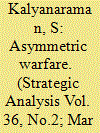

|
|
|
|
|
| Publication |
2012.
|
| Summary/Abstract |
Coined a few years ago, 'asymmetric warfare' is an umbrella term that includes insurgent and terrorist campaigns that Western militaries were forced to contend with in the course of external interventions. Asymmetric wars for Western countries are wars of choice, not wars of necessity.
|
|
|
|
|
|
|
|
|
|
|
|
|
|
|
|
| 2 |
ID:
111283
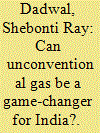

|
|
|
|
|
| Publication |
2012.
|
| Summary/Abstract |
The discovery of extracting unconventional (shale) gas through hydraulic fracturing has revolutionised the gas industry in the US and has given rise to a debate over whether it has the potential to reverse the emerging geopolitical equations in the global energy sector which was hitherto seen to be tilting in favour of the conventional energy producers. This article will attempt to analyse what this means for India's energy security, whether the presence of substantial unconventional gas resources has the potential to alleviate India's energy dilemma and what impact it could have on India's overall energy policy.
|
|
|
|
|
|
|
|
|
|
|
|
|
|
|
|
| 3 |
ID:
111285
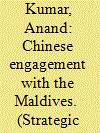

|
|
|
|
|
| Publication |
2012.
|
| Summary/Abstract |
This article explores the objectives of China's engagement in the Maldives and how the current administration of the country is responding to it. The article also looks at how the Maldives has been used by major powers in the past. On the basis of these analyses, it envisages the path that Maldivian foreign policy is likely to follow in the future and its likely impact on the security environment in the Indian Ocean region. The article argues that China is trying to make inroads into the Maldives to fulfil its strategic objectives, but it has not been very successful because of the regime of President Nasheed, which is friendly towards India. However, as Chinese economic engagement in the Maldives increases, it might affect the close relationship between India and the Maldives. The article also highlights that the Chinese thrust into the Indian Ocean cannot be described as a 'string of pearls' to encircle India, but has more to do with furthering its strategic interests and global military ambitions.
|
|
|
|
|
|
|
|
|
|
|
|
|
|
|
|
| 4 |
ID:
111282
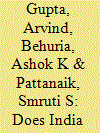

|
|
|
|
|
| Publication |
2012.
|
| Summary/Abstract |
The article argues that India does not have a well-defined neighbourhood policy. It makes a historical survey of the approaches of different Indian leaders to the neighbourhood and examines the reasons for the prevailing negative perceptions about India in the region. It argues that these negative perceptions have come about because India has largely adopted an ad hoc and bilateral approach vis-à-vis its neighbours and has allowed its policy to be guided by an overarching concern for security. In recent years, India's approach has changed considerably. However, it needs clearer articulation. The article suggests that India must effectively communicate its vision of regional integration to its neighbours, enable them to participate profitably in its growing economy, spell out its 'non-negotiables' in matters concerning its security and national interest, maintain linkages at the highest political level, open multiple tracks of communication and take a leadership position in multilateral forums like SAARC and BIMSTEC to bring peace and prosperity to the region through greater cooperation in diverse areas. This will prove effective in improving its relations with its neighbours.
|
|
|
|
|
|
|
|
|
|
|
|
|
|
|
|
| 5 |
ID:
111288


|
|
|
|
|
| Publication |
2012.
|
| Summary/Abstract |
The granting of scheduled tribe status to the Kuki-Chin people eroded their allegiance to clan and linguistic/dialectal identities. While they do not have any problem with a pan-ethnic identity, their primary loyalty is to their own clans and communities. Invocation of kinship ties by different groups does not necessarily translate into a common political agenda. There are at least 15 armed groups among them that have combined into two larger groups-the United People's Front (UPF) and the Kuki National Organisation (KNO)-and signed a peace agreement with the state and central governments. Whereas the militant groups deviated from the macro-nationalist project of the Indian state, their micro-nationalist struggle is not informed by any coherent ideology. The root motivation of their armed struggle clearly originated in their fear of being marginalised by ethnic competition among various peoples of Northeast India in general and of Manipur in particular.
|
|
|
|
|
|
|
|
|
|
|
|
|
|
|
|
| 6 |
ID:
111279
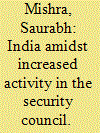

|
|
|
|
|
| Publication |
2012.
|
| Summary/Abstract |
Article 1 of the United Nations Charter declares the maintenance of international peace and security to be the primary function of the United Nations. This makes the United Nations Security Council (UNSC) the most important organ of the whole establishment. All other functions and engagements of the United Nations are in support of the primary cause.
|
|
|
|
|
|
|
|
|
|
|
|
|
|
|
|
| 7 |
ID:
111280
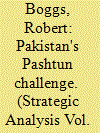

|
|
|
|
|
| Publication |
2012.
|
| Summary/Abstract |
The Pashtun populations of Afghanistan and Pakistan have long been a source of bilateral contention, with each government inciting Pashtun tribals against the other. Now that the majority of Pashtuns live in Pakistan, Islamabad is using its Pashtun connections to project influence into Afghanistan. As a result, both Afghanistan and Pakistan are threatened by runaway Pashtun militancy. Peace and stability in both countries will be impossible until political reforms have been implemented in the Federally Administered Tribal Areas (FATA) of Pakistan. Reforms, with international support, would undermine radical networks and could be leveraged to improve Afghanistan-Pakistan relations.
|
|
|
|
|
|
|
|
|
|
|
|
|
|
|
|
| 8 |
ID:
111287


|
|
|
|
|
| Publication |
2012.
|
| Summary/Abstract |
Most nation-states in Asia and Africa that gained independence from colonial rulers during the middle of the 20th century are diverse in their ethnic composition. The national governments make efforts to politically integrate their constituent units in the face of the continuing resistance of several ethnic groups. India adopted various means to integrate the more than 600 princely states and other loosely administered areas. Although the issue of integration has been largely settled in the mainland, various radical groups in the Northeastern region still question the extension of the Indian state. This article provides a historical analysis of the process of integration of the various states of Northeast India.
|
|
|
|
|
|
|
|
|
|
|
|
|
|
|
|
| 9 |
ID:
111284


|
|
|
|
|
| Publication |
2012.
|
| Summary/Abstract |
This article outlines the National Solar Mission's role as India's major climate change mitigation policy, arguing that India's National Solar Mission (NSM) was initially conceived to bolster India's position against legally binding commitments on carbon emissions. However, the NSM also has twin objectives in energy security. Progress in the NSM is outlined before its problems are examined in order to clarify how the Indian government may direct its development to fulfil energy security and energy access goals. This includes examining possibilities in indigenisation of solar manufacture and international funding before concluding that formal co-operation with China, the dominant photovoltaic manufacturer, could be considered.
|
|
|
|
|
|
|
|
|
|
|
|
|
|
|
|
| 10 |
ID:
111286
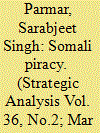

|
|
|
|
|
| Publication |
2012.
|
| Summary/Abstract |
Piracy over the years has been driven by geography, political instability and the availability of safe havens. Apart from these established factors, economics too play a role. This article reviews and examines Somali piracy, which has flourished due to the international community ignoring the growing instability in Somalia, the rampant illegal fishing and toxic waste dumping. It examines the international response, the legal and economic factors and advocates that piracy be viewed as a form of economic terrorism and be combatted as such, as well as by land-based operations.
|
|
|
|
|
|
|
|
|
|
|
|
|
|
|
|
| 11 |
ID:
111289


|
|
|
|
|
| Publication |
2012.
|
| Summary/Abstract |
The latest report of the International Atomic Energy Agency (IAEA) on Iran's alleged nuclear weapons programme, released on November 8, 2011, has effectively raised the global threat level. The agency faced the daunting challenge of making a judgement on how far Iran's nuclear programme has advanced and its potential for weaponisation on the basis of suggestive but dated, inconclusive and possibly fake evidence (hundreds of pages of evidence have been sourced to one laptop of unproven provenance given to the IAEA by a Western intelligence agency).
|
|
|
|
|
|
|
|
|
|
|
|
|
|
|
|
| 12 |
ID:
111281
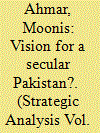

|
|
|
|
|
| Publication |
2012.
|
| Summary/Abstract |
This article will bring to light the transformation of the Pakistani state from a relatively tolerant to an unstable state dominated by militancy and violence. In the formative phase of Pakistan, the notion of religious extremism was almost non-existent as the founder of the country, Quaid-e-Azam Mohammad Ali Jinnah, made it clear that the new state would not be theocratic in nature. However, after his demise on September 11, 1948, his successors failed to curb the forces of religious militancy that not only changed the nature of the Pakistani state but also succeeded in making it a monolithic religious state in which non-Muslims were disqualified from seeking the highest positions in the state structures. This article also aims to examine the vision for a secular order in the context of Pakistan while relating it to the management of conflicts.
|
|
|
|
|
|
|
|
|
|
|
|
|
|
|
|